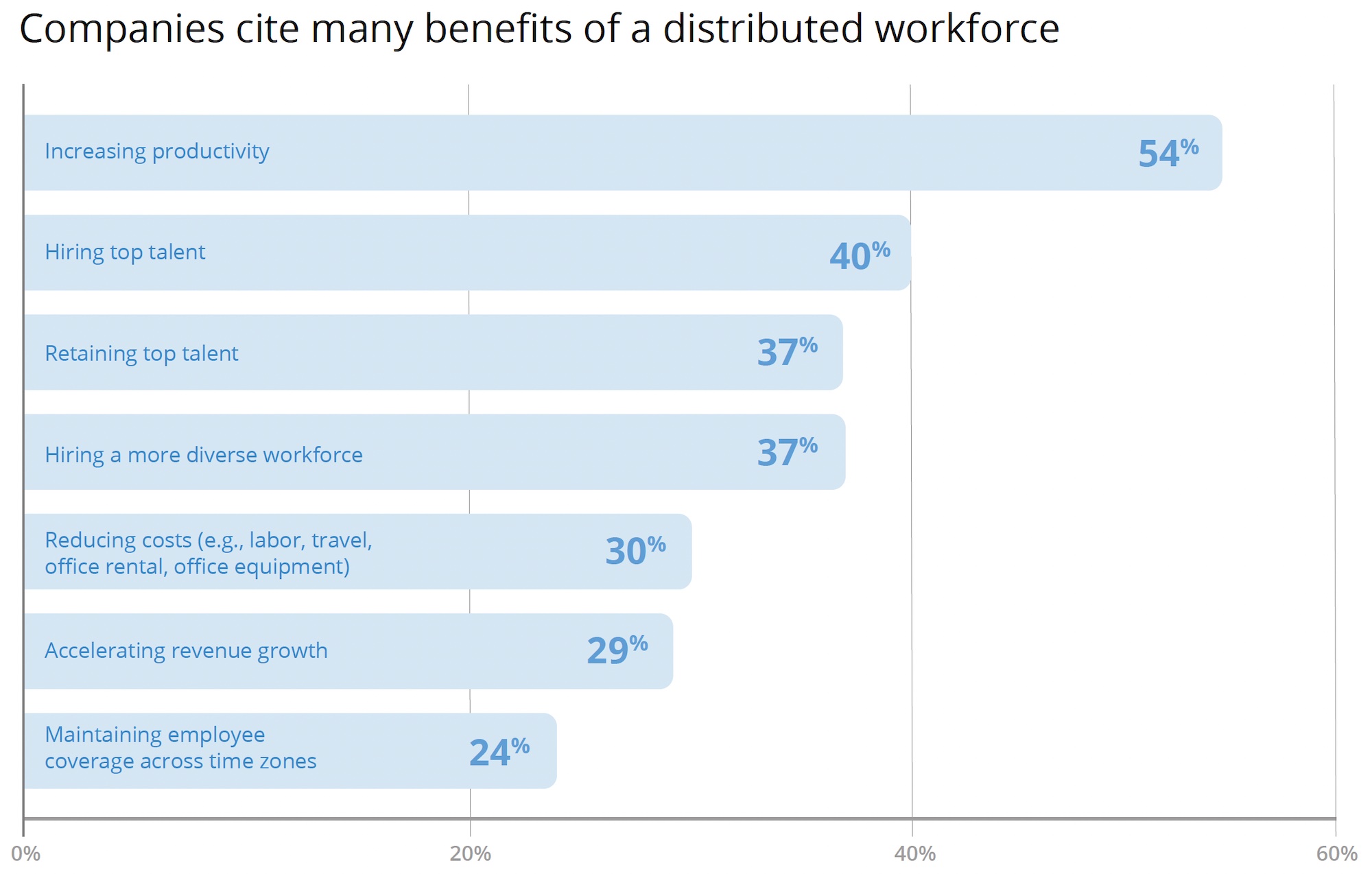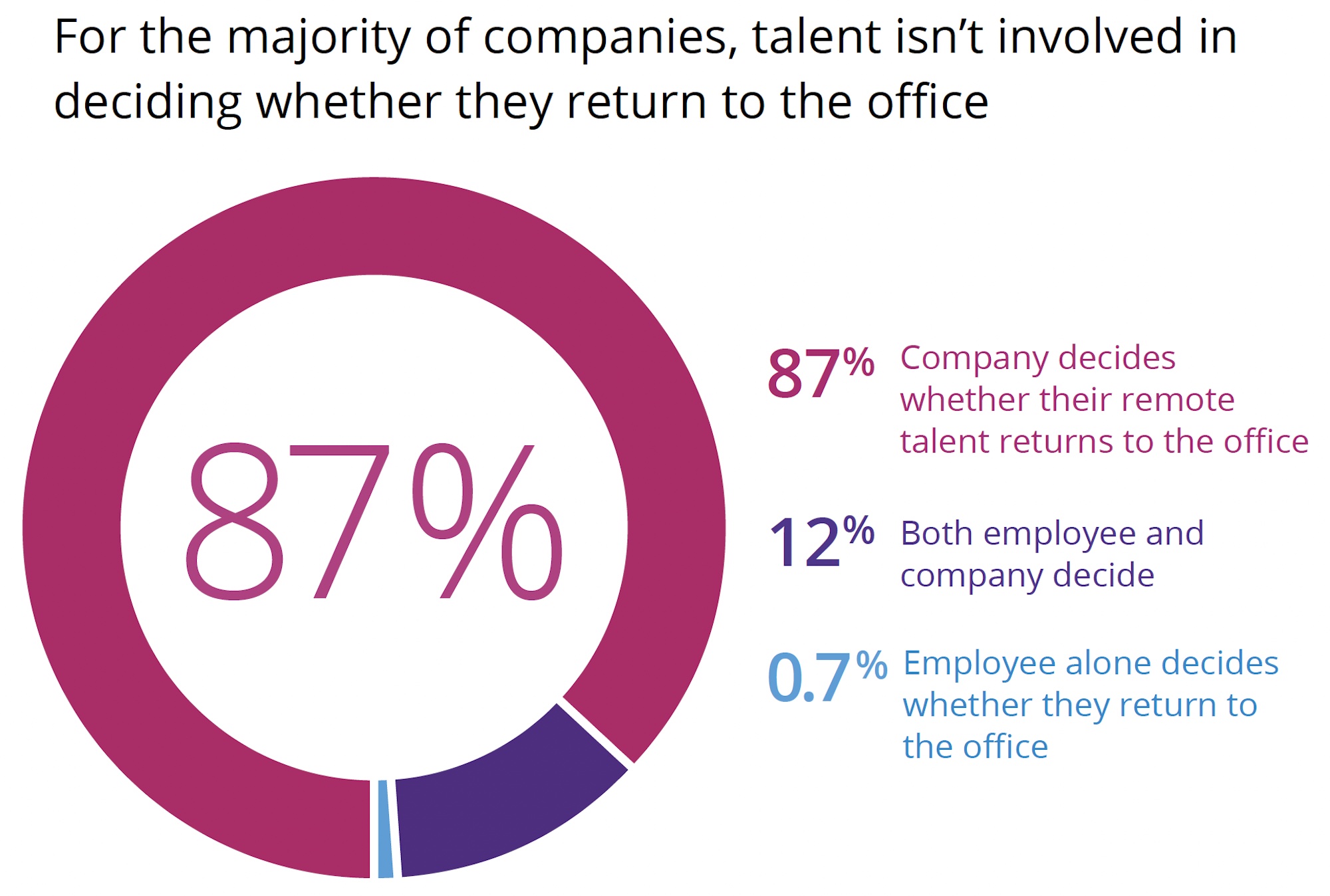Velocity Global’s 2022 Work In Progress Report: Businesses and talent benefit from distributed work
- Written by News Direct
DENVER, US - News Direct - 19 November 2021 -
1,000 surveyed tech leaders say distributed work increases productivity and diversity
Most remote talent to remain untethered to an office post-pandemic
Tech leaders desire to increase remote work for themselves
72% utilize a distributed workforce but face hurdles to expand it
Remote and distributed workforces are here to stay due to the mutual benefits to both businesses and talent according to a new study from Velocity Global[1], the leading provider of global employment solutions. The 2022 Work In Progress — The State of Distributed Work: Tech Sector[2] published today touts multiple benefits of distributed work, shows optimism for growth in the tech sector, but also names challenges for businesses to increase their global workforce.
More than 1,000 U.S. and UK tech company decision-makers participated in the study and 72% say their business utilizes a substantial distributed workforce; 59% say more than half of their workforce is remote, and 61% of U.S. tech leaders report more than half of their remote workers will remain that way for the foreseeable future.
"The world of work is forever changed. The global pandemic accelerated the desire to work from anywhere, and it lit a fire for employers to embrace a truly distributed workforce," said Velocity Global founder and CEO Ben Wright. "The untethered nature of work was on the rise before COVID-19, but the tailwinds accelerated this new way of work as businesses tapped into new talent pools and workers themselves embraced a new freedom. Neither is going back - this change is here to stay."
Despite the growth of distributed and remote work, businesses cite several challenges to embrace the change even further.
"This dramatic shift accelerated faster than the legacy ecosystem built to support the employment infrastructure was capable of handling," added Wright. "We remove the roadblocks to grow businesses and connect employers and talent to simply get work done anywhere and anyhow."
Organizational and personal benefits of remote and distributed work
Remote work refers to talent working at a location other than a company-owned office. Related to the concept of remote work is distributed work, in which companies employ talent that is located in multiple locations domestically or internationally.
The majority of companies (72%) employ a distributed workforce and 79% of these organizations' talent also works remotely.
Respondents who utilize a distributed workforce report clear advantages: 95% say a distributed workforce model benefits their company by increasing productivity (54%), securing top talent (40%), and building a more diverse team (37%).

Respondents indicate talent prefers remote work for similar reasons, reinforcing the mutual benefits.

Interestingly, 3 in 4 of the tech leaders themselves work remotely at least one day per week and desire to increase the amount of time they work remotely.

"Business leaders are people too, and they see the benefits in their personal life as well to their broader organization," said Wright. "Flexibility and mobility are now must-haves for workers fresh out of school or in upper management, and lead to greater productivity and long-term talent retention. It's a win-win."
Optimism for growth with an untethered workforce
The increase in remote and distributed work drove unprecedented demand in the tech sector and organizations feel optimistic about expansion. The survey reports 96% are very or somewhat confident about their company's financial growth over the next year, and 83% believe their industry will grow as well.

That growth is realized by a remote and distributed workforce that mostly will not return to an office. More than half (54%) of respondents say 51-75% of their remote workforce will remain remote over the next year.

Roadblocks create disconnect between employers and talent
The data indicates a brewing dilemma regarding remote work. Talent and businesses both recognize significant benefits, but logistical challenges drive businesses to initiate a return to the office for some. The implications for this disconnect are great, considering the difficulties of finding skilled talent and employees' desired flexibility.
One factor contributing to that discord is the lack of involvement of talent in the decision to return to the office. Eighty-seven percent of organization leaders say their company decides whether remote talent transitions back to working at a company-owned office, as opposed to it being a joint decision. Only 12% report that both the company and talent make that determination.

Tech leaders point to a pivotal moment for distributed work as both businesses and talent desire the benefits. The pandemic increased distributed work for most tech businesses, and 43% will maintain their current distributed workforce. However, the next stage is in question: 21% say they will expand their distributed workforce, 26% plan to reduce it.
These decision-makers cite several forces that challenge their ability to grow their distributed workforce domestically and internationally, particularly among U.S. companies. Ninety-three percent of U.S. tech leaders say they do not have plans to expand their domestic distributed workforce. They point to recruiting, legal registrations in other states, and managing multiple vendors among other challenges.

The growth of international distributed work faces similar roadblocks. Again, 93% of U.S. and UK tech leaders say they do not plan to expand their worldwide distributed workforce, adding foreign entity set-up, global payroll and immigration challenges to a similar list of difficulties.

"The same friction comes up over and over again. Finding the right talent tops both lists and businesses want to tap larger talent pools across the country and the world," said Wright. "Add in the bureaucracy of global regulation and the multiple vendors to navigate it on disparate platforms, and businesses get skittish. We built an end-to-end platform that removes all of this friction because the data is clear: employers and talent just want to work with anyone, anywhere, and anyhow."
Click here to download the full report: 2022 Work in Progress — The State of Distributed Work: Tech Sector[3].
Methodology
To gather the data in this report, Velocity Global surveyed 506 U.S. and 505 UK business leaders in the technology industry (e.g., software, hardware, and IT) who are employed at companies with 50–1,000 employees. The respondents work in a wide range of technology subsectors, including technology, media, and telecom; biotech; mortgage technology, property technology, and real estate technology; insurance technology; cryptocurrency; cybersecurity; and more. Respondents are in director-level and higher positions, including C-suite officers and business owners. Their job functions include human resources, finance, legal, IT/ technology, and operations.
References
- ^ Velocity Global (u.newsdirect.com)
- ^ 2022 Work In Progress — The State of Distributed Work: Tech Sector (u.newsdirect.com)
- ^ Click here to download the full report: 2022 Work in Progress — The State of Distributed Work: Tech Sector (velocityglobal.com)
Authors: News Direct

